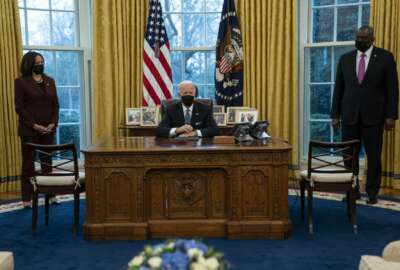
GSA testing to see how much low-value work agency employees are doing
In today's Federal Newscast, over a third of federal employees say they spent as many as five hours out of their work week doing low-value or tedious work.
To listen to the Federal Newscast on your phone or mobile device, subscribe in PodcastOne or Apple Podcasts. The best listening experience on desktop can be found using Chrome, Firefox or Safari.
- Over a third of federal employees say they spent as many as five hours out of their work week doing low-value or tedious work. A survey by the General Services Administration asked 245,000 employees of CFO Act agencies to estimate the amount of time they spend on this type of activity during their typical 40-hour work week. The goal of the survey was to see how much work could be moved to robotics process automation software.
- The Office of Personnel Management is staffing up again with new political appointees. The Biden administration announced 14 new appointees who will join OPM. 85% of them identify as women, people of color or lesbian, gay, bisexual, transgender or queer. Many are Obama-era veterans. Chris Canning is a former Office of Personnel Management senior adviser and will be the agency’s new chief of staff. Margot Conrad spent 15 years at the Partnership for Public Service and will lead the Chief Human Capital Officers Council. Rob Shriver worked at the agency during the Obama administration and will lead an important workforce policy shop at OPM. Biden hasn’t yet announced his nominee to be the OPM director.
- The Office of Management and Budget wants agencies to revisit their COVID-19 workforce plans. OMB said agencies should use telework to the maximum extent possible while COVID-19 transmission rates are high. Office occupancy rates should stay at 25%. The directions are all part of the administration’s efforts to implement President Biden’s new mask mandate. OMB wants agencies to review their staffing plans and create new COVID coordination teams. Those teams will work the new governmentwide safety task force to enforce mask mandates and act on a testing plan for the federal workforce. (Federal News Network)
- The Department of Health and Human Services launches its first agency strategy for artificial intelligence. The HHS strategy will stand up a community of practice to expand AI use cases at the agency, and to oversee the rollout of AI in the health care industry. The Food and Drug Administration is developing a regulatory framework to vet AI and machine learning software for health care uses. The National Institutes of Health have invested in research to use AI to analyze medical images. The strategy stems from an executive order signed by President Donald Trump to build trust in AI algorithms.
- When your agency has a change in leadership, its website needs to be updated to say so. The State and Transportation Departments didn’t do that, and the Government Accountability Office has ruled that they violated the Federal Vacancies Reform Act in the process. In both cases, the websites showed acting officials were in their politically-appointed positions for much longer than the 210 days the Vacancies Act allows. Both departments say the website issues were mere mistakes.
- Federal contractors assess whether the Biden administration’s Buy American executive order will have any practical effects. The EO comes just days after new Buy American rules developed during the Trump administration went into effect. Among other things, they raise the U.S. content required of manufactured goods from the old standard of 50-55%. The Biden proposal calls for a tightened waiver process and established a White House Buy American overseer. Contractors wonder what they and agencies will have to do when certain products don’t have a 55% American Alternative.
- Military contractors may have been overpaid by hundreds of millions of dollars because of unclear policies at the Defense Department. It’s the responsibility of the Defense Contract Audit Agency to make sure contractors only get reimbursed for allowable costs. But a new review of those audits by DoD’s inspector general found that in almost half the cases the IG looked at, Pentagon contracting officers never resolved the red flags DCAA raised. The questionable reimbursements in just those 12 audit reports totaled $232 million. The IG says the payments have stayed unresolved partly because various Defense officials disagree about who has the authority to settle questioned direct costs.
- Several House committees have a deal on how they’ll handle the work of legislating and authorizing the Department of Homeland Security. The House Homeland Security Committee signed an agreement with the chairmen of nine other committees. The chairmen agreed they’d collaborate on an authorization bill for DHS and other legislation for the department’s subcomponents. The homeland security committee will take the lead on that legislation. But the agreement didn’t expand jurisdiction for the House Homeland Security Committee. That’s long been a priority for past homeland security chairmen and current leader Bennie Thompson (D-Miss.).
- DoD’s rollout of its Cybersecurity Maturity Model Certification standards is picking up steam. The Navy and the Defense Logistics Agency are running CMMC pathfinders with private sector assessors. There are 100 assessors who have gone through the training course and the CMMC Accreditation Body has approved 41 third party assessment organizations and have another 30 in the process. These are the signs that the Pentagon’s supply chain risk management effort is accelerating. DoD expects to put CMMC standards in 10 requests for information this spring and estimates about 1,500 contractors will need to achieve at least a level one certification in the first year.
- President Joe Biden named a new head to the Postal Service’s regulatory agency. Michael Kubayanda will serve as chairman of the Postal Regulatory Commission, after serving as its second in command. He’ll take over for Robert Taub, who’s held the job for more than six years. The PRC approves changes in postage rates proposed by the Postal Service, and oversees USPS compliance with its legal mandates.
- The National Nuclear Security Administration will host another virtual job fair tomorrow. NNSA is looking for about 2,000 new employees to join its federal and contractor workforce. The Nuclear Security Enterprise is looking for engineers, cybersecurity specialists, attorneys, scientists and others at its labs, plants and other sites. Those who are interested in attending will chat one-on-one with federal and contractor hiring managers and HR specialists. They’ll also visit virtual hiring booths and have the opportunity to submit resumes on the spot. NNSA says it’ll conduct follow-up interviews in the days following the virtual event.
Copyright © 2025 Federal News Network. All rights reserved. This website is not intended for users located within the European Economic Area.
Eric White
Eric White is news anchor and Federal Drive producer at Federal News Network.
Follow @FEDERALNEWSCAST




